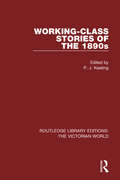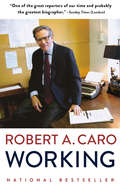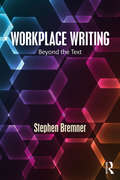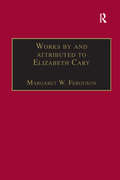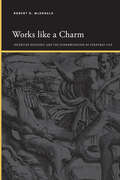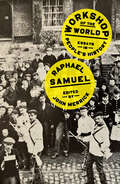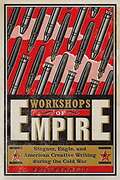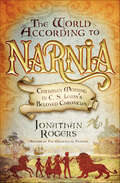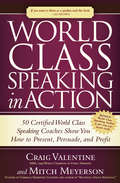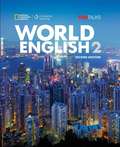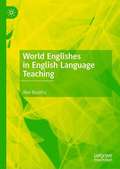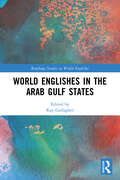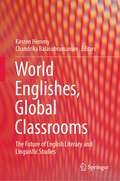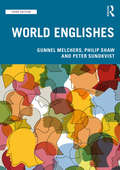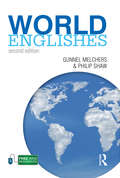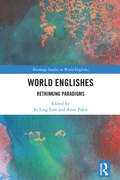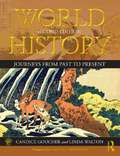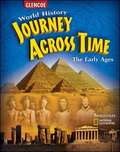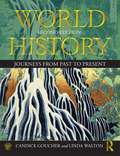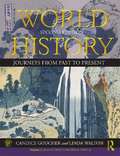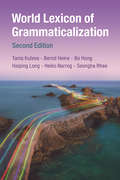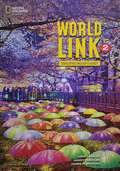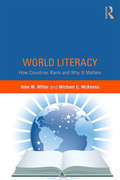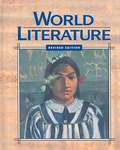- Table View
- List View
Working-class Stories of the 1890s (Routledge Library Editions: The Victorian World #30)
by P. J. KeatingFirst published in 1971, this collection of short stories, set in the East End of London in the 1890s, offers a corrective to the view of nineties’ literature as dominated by aestheticism, and shows how many late Victorian writers tried to break with Dickensian models and write of working class life with less moral intrusion and a greater sense of realism. The editor has provides a succinct, historical and critical introduction, a bibliography of further reading, notes on the authors and stories, and a glossary of slang and phoneticized words. This book will be of particular interest to students of Victorian literature.
Working: Researching, Interviewing, Writing
by Robert A. Caro&“One of the great reporters of our time and probably the greatest biographer.&” —The Sunday Times (London)From the two-time Pulitzer Prize-winning author of The Power Broker and The Years of Lyndon Johnson: an unprecedented gathering of vivid, candid, deeply moving recollections about his experiences researching and writing his acclaimed books.Now in paperback, Robert Caro gives us a glimpse into his own life and work in these evocatively written, personal pieces. He describes what it was like to interview the mighty Robert Moses and to begin discovering the extent of the political power Moses wielded; the combination of discouragement and exhilaration he felt confronting the vast holdings of the Lyndon B. Johnson Library in Austin, Texas; his encounters with witnesses, including longtime residents wrenchingly displaced by the construction of Moses' Cross-Bronx Expressway and Lady Bird Johnson acknowledging the beauty and influence of one of LBJ's mistresses. He gratefully remembers how, after years of working in solitude, he found a writers' community at the New York Public Library, and details the ways he goes about planning and composing his books.Caro recalls the moments at which he came to understand that he wanted to write not just about the men who wielded power but about the people and the politics that were shaped by that power. And he talks about the importance to him of the writing itself, of how he tries to infuse it with a sense of place and mood to bring characters and situations to life on the page. Taken together, these reminiscences—some previously published, some written expressly for this book—bring into focus the passion, the wry self-deprecation, and the integrity with which this brilliant historian has always approached his work.To understand more about Robert Caro's research, see the Sony Pictures Classic documentary &“Turn Every Page.&”
Workplace Writing: Beyond the Text
by Stephen BremnerWorkplace Writing: Beyond the Text draws together a wealth of research into different aspects of writing in workplace settings, creating a comprehensive picture of workplace writing and covering factors and activities that go far beyond the text. In a full analysis of the challenges facing the student writer transitioning from the academy to the workplace, this book: covers topics ranging from intertextuality and collaborative writing practices to considerations of power and politeness, and the impact of organisational culture and processes of socialisation brings together the multiple, often interlinked factors that surround and impact on the process of workplace writing and the texts produced in professional settings takes a close look at the pedagogical implications of the various issues relating to workplace writing serves as a resource for teachers who want to go beyond potentially simplistic accounts of writing in the workplace and to provide students with a richer picture of what happens there Workplace Writing will be essential reading for any students, pre- and in-service teachers and researchers with an interest in professional and business discourse and language teaching for specific purposes.
Works by and attributed to Elizabeth Cary: Printed Writings 1500–1640: Series 1, Part One, Volume 2 (The Early Modern Englishwoman: A Facsimile Library of Essential Works & Printed Writings, 1500-1640: Series I, Part One)
by Margaret W. FergusonElizabeth Cary (c.1585-1639) was an accomplished scholar of languages and theology. Her considerable strength of character was demonstrated by her public conversion to Catholicism in 1625 thereby creating an irrevocable rift in her marriage and her family. Her biography, written by her daughter, says she wrote ’for her private recreation’ and mentions various works, now lost, including the lives of saints, and poems to the Virgin Mary. She is best known today, however, for the works reproduced here.
Works like a Charm: Incentive Rhetoric and the Economization of Everyday Life (SUNY series, Insinuations: Philosophy, Psychoanalysis, Literature)
by Robert O. McDonaldWorks like a Charm addresses a simple question: Why are “incentives” everywhere now? From inducements to work harder at our jobs to tax rebates for corporations, “incentive” names a general theory of motivation—according to economists, we are incentive-driven creatures. Yet far from being a neutral generalization, this understanding of human behavior smuggles in a quintessentially economic way of seeing the world. Works like a Charm applies Jacques Lacan's psychoanalytic concept of retroactive causality to explain the metastasis of the language and logic of incentives: To discover an incentive is to place in the untouchable past an economic cause for a contextual, historical force. Tracing “incentive” from its roots in antiquity to its uptake by neoclassical and then Chicago-school economists, Robert O. McDonald diagnoses the spread of incentives across the social, cultural, and political field and warns readers of the dangers of handing over causality to the economists.
Workshop of the World: Essays in People's History
by Raphael SamuelA new collection of essays from one of the most influential historians of the twentieth century&‘ONE OF THE MOST OUTSTANDING, ORIGINAL INTELLECTUALS OF HIS GENERATION&’, Stuart Hall, author of The Hard Road to RenewalThe work of the pioneering historian Raphael Samuel opened up new vistas of historical enquiry. He was committed to the idea of people&’s history, in which he excavated the ordinary lives of those often overlooked or discarded by other writers. This &‘unofficial knowledge&’ transformed what history was, who was allowed to do it, and who it was for.Workshop of the World brings the full range and depth of Samuel&’s historical writing on nineteenth-century Britain to the fore. From his pioneering study of the influence of the Catholic Church on England&’s Irish population to his expansive and erudite essay on the itinerant labourers of Victorian Britain, the collection captures both the breadth and depth of his learning. Guided by both a political engagement as well as a methodological commitment to uncovering the stories of ordinary people, Workshop of the World will help introduce Raphael Samuel&’s work to a new generation of readers.
Workshops of Empire: Stegner, Engle, and American Creative Writing During the Cold War (New American Canon)
by Eric BennettDuring and just after World War II, an influential group of American writers and intellectuals projected a vision for literature that would save the free world. Novels, stories, plays, and poems, they believed, could inoculate weak minds against simplistic totalitarian ideologies, heal the spiritual wounds of global catastrophe, and just maybe prevent the like from happening again. As the Cold War began, high-minded and well-intentioned scholars, critics, and writers from across the political spectrum argued that human values remained crucial to civilization and that such values stood in dire need of formulation and affirmation. They believed that the complexity of literature—of ideas bound to concrete images, of ideologies leavened with experiences—enshrined such values as no other medium could. <p><p> Creative writing emerged as a graduate discipline in the United States amid this astonishing swirl of grand conceptions. The early workshops were formed not only at the time of, but in the image of, and under the tremendous urgency of, the postwar imperatives for the humanities. Vivid renderings of personal experience would preserve the liberal democratic soul—a soul menaced by the gathering leftwing totalitarianism of the USSR and the memory of fascism in Italy and Germany. <p><p> Workshops of Empire explores this history via the careers of Paul Engle at the University of Iowa and Wallace Stegner at Stanford. In the story of these founding fathers of the discipline, Eric Bennett discovers the cultural, political, literary, intellectual, and institutional underpinnings of creative writing programs within the university. He shows how the model of literary technique championed by the first writing programs—a model that values the interior and private life of the individual, whose experiences are not determined by any community, ideology, or political system—was born out of this Cold War context and continues to influence the way creative writing is taught, studied, read, and written into the twenty-first century.
World According to Narnia: Christian Meaning in C. S. Lewis's Beloved Chronicles
by Jonathan RogersA lively and engaging exploration of the many Christian themes in C.S. Lewis's widely-known and universally loved children's stories.
World Class Speaking in Action: 50 Certified World Class Speaking Coaches Show You How to Present, Persuade, and Profit
by Mitch Meyerson Craig ValentineThe definitive guide to powerful presentations: &“If you want to thrive as a speaker, read this book&” (Les Brown). How do you keep your audience on the edge of their seats and turn your presentations into profits? Here, dozens of industry professionals provide real-life examples and case studies on how to . . . * Craft an unforgettable message that hits home * Deliver your speech in a way that keeps your audience engaged * Sell your message so your audience members take the exact next step you want them to take * Master leading-edge digital technologies and speak to thousands World Class Speaking in Action covers both the art and the business of public speaking—a one-stop shop for building breakthrough presentations and turning them into bundles of profits.
World English 2 (Second Edition)
by Kristin L. Johannsen Rob Jenkins Rebecca Tarver ChaseIn the context of language development, this approach becomes essential to real learning and understanding. Learning a language is a skill that is developed only after significant practice.
World Englishes in English Language Teaching
by Alex BarattaThis book provides an in-depth exploration of World Englishes and their place in the English as a Foreign Language (EFL) classroom. It opens with a critical assessment of the research to date that includes analysis of competing and complementary terms such as English as an International Language (EIL), Global English, English as a Lingua Franca (ELF) and 'Glocal English'. Here, and throughout the work, the author problematizes the terminologies used to define and describe Englishes, arguing for example for the need to distinguish between Chinglish and China English. The book then turns to an examination of three case study varieties of non-inner circle English: Konglish, Singlish and Indian English; before exploring the results of an original empirical study into language attitudes concerning several varieties of English among language teachers and learners. Finally, sample exercises for the classroom are provided. This book will be of particular interest to language teachers and teacher trainers, and to students and scholars of EFL and applied linguistics more broadly.
World Englishes in the Arab Gulf States (Routledge Studies in World Englishes)
by Kay GallagherKay Gallagher gathers insightful research from across the lower Arabian gulf to uncover the richness and diversity of World Englishes within the contemporary Arab Gulf states. Her volume presents novel research from this emerging nexus of rapid economic, social, and linguistic development.The countries of the lower Arabian Gulf (Bahrain, Kuwait, Oman, Qatar, Saudi Arabia, and the United Arab Emirates) have, to varying degrees, harnessed English as an internal working language and as a means to communicate globally. Gulf countries that have not featured much in the WE literature to date are highlighted in this volume, including Bahrain and Kuwait, and the use of English in the emerging colossus of Saudi Arabia is examined. Novel insights from more prominent locations are presented here for the first time, including the use of English to counter negative Islamic stereotypes during the FIFA World Cup 2022 in Qatar, and its role in ensuring safety in a multilingual, high-risk industry in the UAE. New research into the challenges encountered in English-medium higher education in Oman and Kuwait is reported also. The linguistic features of “Gulf English” are explored, and the interplay and tensions between Arabic and English and other languages are addressed. The Englishes of expatriate populations in the Gulf are examined, including the English identity of majority and minority resident transnational groups. The issue of whether a distinctive variety of Gulf English has emerged in this multilingual melting pot, characterized by transience and flux, is debatable, and the establishment of “Gulf English” as an endonormative new variety remains elusive.This book will appeal to those with an interest in World Englishes in general, as well as those who are interested in the roles and varieties of English in use in this globally unique and rapidly evolving context.The six states of the Lower Gulf - Bahrain, Kuwait, Oman, Qatar, Saudi Arabia, and the United Arab Emirates (UAE) - form an economic and political alliance known as the Gulf Cooperation Council (GCC). The region’s oil-rich economies have attracted millions of migrant workers, both blue-collar and white-collar, from East and West. Transnational workers have brought linguistic diversity along with multiple varieties of English to this traditionally Arabic-speaking region, amplifying an increased internal demand for English, such that English is shifting in the Gulf from a foreign language to a lingua franca.
World Englishes, Global Classrooms: The Future of English Literary and Linguistic Studies
by Kirsten Hemmy Chandrika BalasubramanianThis book provides a critical overview of contemporary world issues in Language and Literary Studies. It offers specific ideas as to how to move away from the traditional literary canon, on the one hand, and traditional native-speaker norms in English language teaching, on the other. It delivers a global perspective of both the growth and the challenges in ELT studies around the world. Following the introduction, the first section of the book contains chapters from international scholars on recognizing and diversifying Englishes in today’s language and translation classrooms. Specifically, the chapters focus on issues such as the cultural hegemony of a monolithic English, English and university pedagogy, English as a gatekeeper, and the role of a reconceived English education in promoting cross-cultural understanding. The second section focuses on the interaction of literature and culture, with specific chapters focusing on decolonizing the traditional literary canon, defining a global text, representing cultural interactions in literary texts, and emerging genres in contemporary English literature. Both sections of the book question the existing boundaries in a post-2020 world, specifically in a non-western world. It is an indispensable resource for scholars in cultural studies, linguistics, and literary studies.
World Englishes: An Introduction (English Language Ser.)
by Gunnel Melchers Philip Shaw Peter SundkvistThe third edition of World Englishes provides an engaging overview of the global variations in vocabulary, grammar, phonology and pragmatics of English as it is used worldwide. This book introduces the principles of linguistic variation and provides coverage on the roots of English, the spread of English, variations of English as a second language and trends for the future. Thoroughly updated throughout in line with recent research, this third edition now also includes: 43 audio examples of speakers of native (17) and of non-native (26) English reflecting the global variety of the language, available to download from www.routledge.com/9781138487659; descriptions of selected twenty-first century developing varieties including Chinese English, Russian English and Vietnamese English; greater linguistic detail on second-language English in many areas; improved and updated descriptions of first-language varieties; a new framework for describing lexical variation; full discussion throughout of English in social media. Offering a thorough and detailed descriptive account of all the main varieties of English across the globe, World Englishes provides a balanced discussion of political issues and the sociolinguistic background to variation in English spoken and written, face-to-face, on paper and online, in the twenty-first century. This book is essential reading for students approaching this topic for the first time.
World Englishes: An Introduction (The English Language Series)
by Gunnel Melchers Philip ShawWorld Englishes, Second Edition provides you with an engaging overview of the global variations in vocabulary, grammar, phonology and pragmatics of English as it is used worldwide.It introduces you to the principles of linguistics variation and provides coverage on the roots of English (including Scots), the spread of English, variation of English as a second language, and trends for the future.Thoroughly updated in line with recent research, World Englishes Second Edition also includes: additional material on small native communities, the anglicization of EU agencies and the effects of media exposure full discussion throughout of internet-mediated communication, such as the language used on Facebook and in chat-roooms descriptions of twenty-first century developing varieties such as China English chapters that begin with a 'focus' question and end with a 'discussion' question to encourage you to reflect on what you are learning, chapter by chapter a revised glossary of technical terms that allows you to revise meanings quickly and easily 20 audio examples of speakers of native and non-native English from all five continents, available for you to download from http://www.routledge.com/cw/melchers/ Offering a thorough and detailed descriptive account of all the main varieties of English across the globe, World Englishes, Second Edition provides a balanced discussion of political issues and the socio-linguistics background to the varieties of English spoken and written, face-to-face, on paper and online, in the twenty-first century.Gunnel Melchers is Professor Emerita, Department of English, Stockholm University.Philip Shaw is Professor, Department of English, Stockholm University.
World Englishes: Rethinking Paradigms (Routledge Studies in World Englishes)
by Anne Pakir Ee Ling LowIn this book, leading scholars in the field of World Englishes (WE) offer fresh perspectives in re-thinking issues on the use of English as a global language in an interconnected world. Established as a legitimate field of study, WE offers a conceptual framework which has influenced scholarship in many related disciplines: contact linguistics, postcolonial Englishes, English as a lingua franca, English as an international language, and applied linguistics. This seminal volume will have an excellent balance between theoretical and empirical works focusing on scholarship that has arisen in relation to the Kachruvian Three Concentric Circles model. This book covers topics such as state-of-the-art review of WE, WE and contact linguistics, post-colonial Englishes, English as a Lingua Franca, English as an International Language, WE and applied linguistics, language measurement and testing in WE, language policy and management, language education and dynamic ecologies, language typology, WE as a new canon, WE and corpus linguistics, WE and multimodalities, and makes predictions about the future of WE. It contains a comprehensive and up-to-date bibliography of major works published in the field.
World History: From 1500 CE to the Present
by Candice Goucher Linda WaltonWorld History: Journeys from Past to Present uses common themes to present an integrated and comprehensive survey of human history from its origins to the present day. By weaving together thematic and regional perspectives in coherent chronological narratives, Goucher and Walton transform the overwhelming sweep of the human past into a truly global story that is relevant to the contemporary issues of our time. Revised and updated throughout, the second edition of this innovative textbook combines clear chronological progression with thematically focused chapters. In this volume, chapters are divided into three parts as follows: PART 4. BRIDGING WORLDS (1300-1800 CE) PART 5. TRANSFORMING LIVES (1500-1900) PART 6. FORGING A GLOBAL COMMUNITY (1800- Present) The expanded new edition boasts an impressive full-color design with a host of illustrations, maps and primary source excerpts integrated throughout. Chapter opening timelines supply context for the material ahead, while end of chapter questions and annotated additional resources provide students with the tools for independent study. Each chapter and part boasts introductory and summary essays that explain and guide the reader in comprehending the relevant theme. In addition, the companion website offers a range of resources including an interactive historical timeline, an indispensable study skills section for students, tips for teaching and learning thematically, and PowerPoint slides, lecture material and discussion questions in a password protected area for instructors. This textbook provides a basic introduction for all students of World History, while at the same time incorporating the thematic perspectives that encourage critical thinking, link to globally relevant contemporary issues, and stimulate further study. ?
World History: Journey Across Time, The Early Ages
by Jackson J. SpielvogelJourney Across Time: The Early Ages is an all-new middle school world history program organized chronologically from the first humans and ancient civilizations to the present. Co-authored by National Geographic and Jackson Spielvogel, Journey Across Times: The Early Ages' engaging narrative and outstanding visuals transport students back in time. As co-author, National Geographic ensures that students understand the influence of geography on historical events. The result is a standards-based program with important geography skills embedded in every lesson. Journey Across Time: The Early Ages is available in a full volume and also as Course 1 (7000 B.C. to A.D. 800) and Course 2 (A.D. 500 to A.D. 1750).
World History: Journeys from Past to Present
by Candice Goucher Linda WaltonWorld History: Journeys from Past to Present uses common themes to present an integrated and comprehensive survey of human history from its origins to the present day. By weaving together thematic and regional perspectives in coherent chronological narratives, Goucher and Walton transform the overwhelming sweep of the human past into a truly global story that is relevant to the contemporary issues of our time. Revised and updated throughout, the second edition of this innovative textbook combines clear chronological progression with thematically focused chapters divided into six parts as follows: PART 1. EMERGENCE (Human origins to 500 CE) PART 2. ORDER (1 CE-1500 CE) PART 3. CONNECTIONS (500-1600 CE) PART 4. BRIDGING WORLDS (1300-1800 CE) PART 5. TRANSFORMING LIVES (1500-1900) PART 6. FORGING A GLOBAL COMMUNITY (1800- Present) The expanded new edition features an impressive full-color design with a host of illustrations, maps and primary source excerpts integrated throughout. Chapter opening timelines supply context for the material ahead, while end of chapter questions and annotated additional resources provide students with the tools for independent study. Each chapter and part boasts introductory and summary essays that guide the reader in comprehending the relevant theme. In addition, the companion website offers a range of resources including an interactive historical timeline, an indispensable study skills section for students, tips for teaching and learning thematically, and PowerPoint slides, lecture material and discussion questions in a password protected area for instructors. This textbook provides a basic introduction for all students of World History, incorporating thematic perspectives that encourage critical thinking, link to globally relevant contemporary issues, and stimulate further study.
World History: Journeys from Past to Present - VOLUME 1: From Human Origins to 1500 CE
by Candice Goucher Linda WaltonWorld History: Journeys from Past to Present uses common themes to present an integrated and comprehensive survey of human history from its origins to the present day. By weaving together thematic and regional perspectives in coherent chronological narratives, Goucher and Walton transform the overwhelming sweep of the human past into a truly global story that is relevant to the contemporary issues of our time. Revised and updated throughout, the second edition of this innovative textbook combines clear chronological progression with thematically focused chapters. In this volume, chapters are divided into three parts as follows: PART 1. EMERGENCE (Human origins to 500 CE) PART 2. ORDER (1 CE-1500 CE) PART 3. CONNECTIONS (500-1600 CE) The expanded new edition features an impressive full-color design with a host of illustrations, maps and primary source excerpts integrated throughout. Chapter opening timelines supply context for the material ahead, while end of chapter questions and annotated additional resources provide students with the tools for independent study. Each chapter and part boasts introductory and summary essays that guide the reader in comprehending the relevant theme. In addition, the companion website offers a range of resources including an interactive historical timeline, an indispensable study skills section for students, tips for teaching and learning thematically, and PowerPoint slides, lecture material and discussion questions in a password protected area for instructors. This textbook provides a basic introduction for all students of World History, incorporating thematic perspectives that encourage critical thinking, link to globally relevant contemporary issues, and stimulate further study.
World Lexicon of Grammaticalization
by Heiko Narrog Tania Kuteva Bernd Heine Bo Hong Haiping Long Seongha RheeExtensively revised and updated, this second edition provides, in an A-Z format, an analysis of the most important generalizations that have been made on the unidirectional change of grammatical forms and constructions. Based on the analysis of more than 1,000 languages, it reconstructs over 500 processes of grammatical change in the languages of the world, including East Asian languages such as Chinese, Korean and Japanese. Readers are provided with the tools to discover how lexical and grammatical meanings can be related to one another in a principled way, how such issues as polysemy, heterosemy, and transcategoriality are dealt with, and why certain linguistic forms have simultaneous lexical and grammatical functions. Definitions of lexical concepts are provided with examples from a broad variety of languages, and references to key relevant research literature. Linguists and other scholars will gain a better understanding of languages on a worldwide scale.
World Link 2
by Nancy Douglas John Hughes James R. MorganWorld Link, Fourth Edition teaches learners to communicate confidently. It develops integrated language skills with an emphasis on spoken English through familiar topics, relevant grammar, and essential vocabulary. World Link brings the world to the classroom through a famously fun video program, relatable National Geographic content, and teacher-tested lessons.
World Literacy: How Countries Rank and Why It Matters
by Michael C. McKenna John W. MillerInternational literacy assessments have provided ample data for ranking nations, charting growth, and casting blame. Summarizing the findings of these assessments, which afford a useful vantage from which to view world literacy as it evolves, this book examines literate behavior worldwide, in terms of both the ability of populations from a wide variety of nations to read and the practice of literate behavior in those nations. Drawing on The World’s Most Literate Nations, author Jack Miller’s internationally released study, emerging trends in world literacy and their relationships to political, economic, and social factors are explored. Literacy, and in particular the practice of literate behaviors, is used as a lens through which to view countries’ economic development, gender equality, resource utilization, and ethnic discrimination. Above all, this book is about trajectories. It begins with historical contexts, described in terms of support for literate cultures. Based on a variety of data sources, these trends are traced to the present and then projected ahead. The literate futures of nations are discussed and how these relate to their economic and sociocultural development. This book is unique in providing a broader perspective on an intractable problem, a vantage point that offers useful insights to inform policy, and in bringing together an array of relevant data sources not typically associated with literacy status.
World Literature
by Susan Wittig Albert Richard Cohen Carroll Moulton David Adams Leeming Rose Sallberg Kam Thomas MonsellWorld Literature textbook for high school
